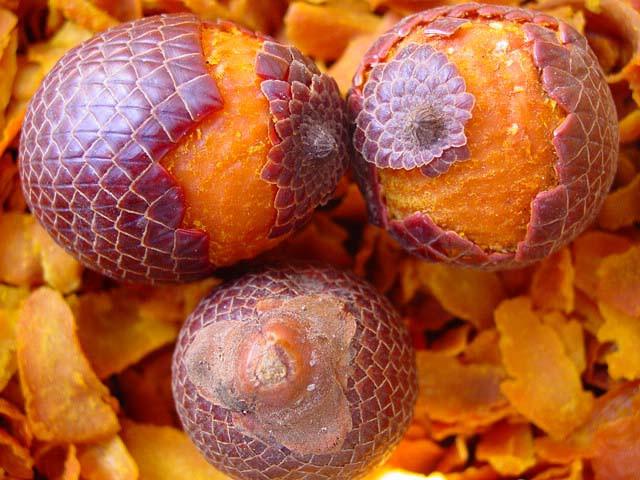Love it? Add to your wishlist
Your favorites, all in one place. Shop quickly and easily with the wishlist feature!
[message]
[title]
[message]




Veliyath Gardens
Couldn't load pickup availability
Aguaje: The Amazonian Superfruit Palm for Health, Beauty, and Biodiversity
Botanical Name: Mauritia flexuosa
In the flooded forests and wetlands of the Amazon, there stands a majestic palm with towering grace and powerful healing potential—the Aguaje, botanically known as Mauritia flexuosa. This tropical palm is far more than just a wild beauty. It is a source of nourishment, a cultural emblem, and a vital component of ecological stability. Its fruits are revered for their unique flavor, high nutritional value, and hormone-balancing properties, making it a sought-after plant for those who wish to embrace a more natural and holistic lifestyle.
Now nurtured and grown at Veliyath Gardens, the Aguaje palm offers a rare opportunity for plant lovers to welcome a legendary Amazonian species into their gardens.
Common Name: Aguaje
Botanical Name: Mauritia flexuosa
Also Known As:
Moriche palm (Venezuela)
Buriti, Muriti, Miriti (Brazil)
Canangucho (Colombia)
Ita palm, It palm (general English usage)
This palm is celebrated across Peru, Brazil, and Colombia, each community connecting deeply with its fruit, wood, and medicinal potential.
A long-lived, dioecious palm, meaning male and female flowers grow on separate trees.
Reaches a height of 30–40 meters, crowned with a canopy of fan-like, feathered leaves.
Grows naturally in wetlands, swamps, and floodplains, and is remarkably suited to areas with high soil moisture or seasonal flooding.
Its deep root system stabilizes soil, helping prevent erosion in sensitive ecosystems.
The fruit is oval-shaped, about 6 cm long and 4 cm in diameter, with a characteristic curved edge.
Skin is firm, glossy, and scaly, with deep maroon to reddish-brown segments.
Inside lies a thin layer of yellow, creamy, semi-oily pulp, encasing a large brown seed.
Different varieties exist, with subtle differences in skin tone, pulp color, texture, and flavor.
The taste of Aguaje is complex and deeply satisfying, often described as a rich combination of sweet, salty, and slightly acidic notes, with an undertone of nuttiness.
Culinary Uses:
Consumed raw or soaked to soften the skin
Used in Amazonian smoothies, traditional aguajina drinks, and fruit bars
Mixed into ice creams, jams, and desserts
Sometimes used in savory stews for its depth of flavor
In many Amazonian towns, Aguaje juice stalls are common, offering it as a cooling, energizing refreshment in hot climates.
Aguaje is not just a fruit—it is regarded as a functional food with numerous medicinal applications.
Rich in Vitamin A (as beta-carotene):
Supports eye health, improves skin tone, and reduces inflammation
Excellent source of Vitamin C:
Boosts the immune system, helps in collagen production
Contains Vitamin E:
Protects against oxidative stress and supports cellular health
High in phytoestrogens:
Natural plant compounds that support hormonal balance, especially in women
Promotes healthy hair, glowing skin, and improved bone strength
Rich in antioxidants and essential fatty acids:
Beneficial for cardiovascular health
Helps regulate cholesterol levels and boost metabolic function
Climate Requirement:
Thrives in humid, tropical conditions
Needs ample water supply, making it ideal for wetland zones or lowland gardens with irrigation
Soil: Prefers sandy to clayey soil with constant moisture
Sunlight: Requires full to partial sunlight
Fruiting Time: Begins producing fruit in about 4 to 5 years after planting
Maintenance: Moderate
Requires consistent watering
Occasional pruning of dead fronds
Monitoring for pests is minimal due to the palm’s natural resilience
Freshly harvested fruits can be kept at room temperature for 3–5 days
Soaking in warm water helps loosen the skin and enhance the flavor
Pulps can be refrigerated and consumed within a week, or frozen for future culinary use
Dried or processed pulp is sometimes used in natural supplements and energy powders
Revered by indigenous communities in Peru and Brazil, the fruit is regarded as a symbol of fertility and feminine strength.
It is traditionally used to nourish mothers during pregnancy, promote recovery after childbirth, and maintain hormonal wellness.
The Aguaje palm is also used for:
Making roofing materials from leaves
Handicrafts and mats from fibers
Palm oil extraction from the seeds
In Amazonian markets, the fruit is sometimes called "the fruit of women" due to its rich phytoestrogen content.
Ideal for those seeking a natural supplement to support skin, hair, and hormonal health
The fruit’s complex flavor and rich nutritional profile make it suitable for daily consumption in various forms
Planting an Aguaje palm adds not only a rare tropical element to your landscape but also connects you with centuries-old Amazonian wisdom
At Veliyath Gardens, we carefully cultivate rare and medicinal fruit trees like the Aguaje (Mauritia flexuosa) to bring you closer to nature’s most precious offerings. Sourced from authentic tropical origins and grown with expertise, our Aguaje plants are ready to thrive in your garden with the right care and setting.
Bring home the Aguaje tree, and make your garden not just a space of greenery—but a sanctuary of wellness, tradition, and natural beauty.
Climate Requirement:
Thrives in humid, tropical conditions
Needs ample water supply, making it ideal for wetland zones or lowland gardens with irrigation
Soil: Prefers sandy to clayey soil with constant moisture
Sunlight: Requires full to partial sunlight
Rich in Vitamin A (as beta-carotene):
Supports eye health, improves skin tone, and reduces inflammation
Excellent source of Vitamin C:
Boosts the immune system, helps in collagen production
Contains Vitamin E:
Protects against oxidative stress and supports cellular health
At Veliyath Gardens, we carefully cultivate rare and medicinal fruit trees like the Aguaje (Mauritia flexuosa) to bring you closer to nature’s most precious offerings. Sourced from authentic tropical origins and grown with expertise, our Aguaje plants are ready to thrive in your garden with the right care and setting.





